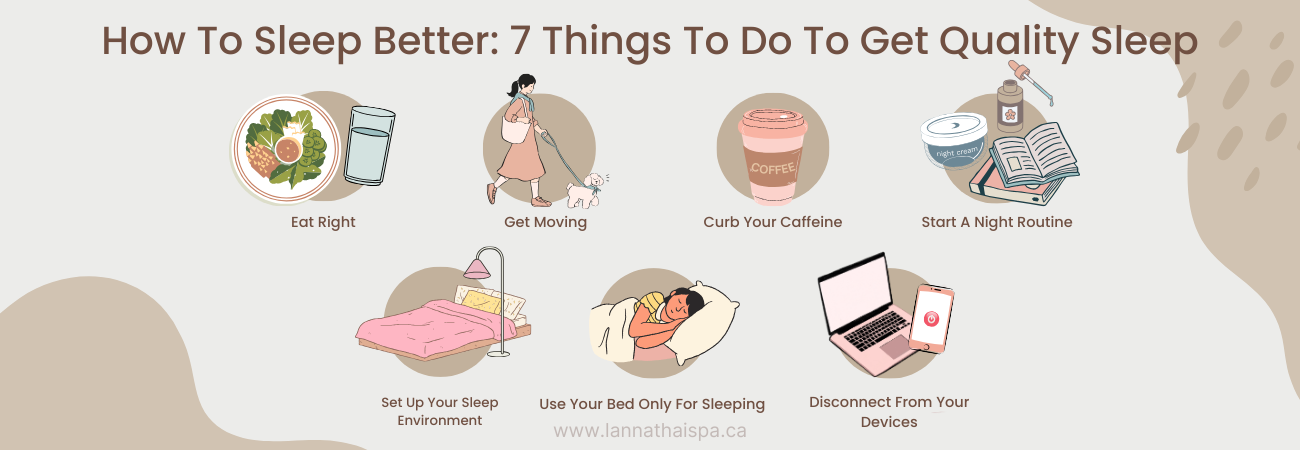Photo Credits to www.india.com
A good night’s sleep will be out of your reach if you don’t follow good sleep hygiene. While a restless night might leave you feeling irritable and low energy the next day, It’s not usually a problem. However, long-term low quality sleep is much more serious – it can lead to a host of health problems such as diabetes, obesity, stroke, and even heart disease.
I cannot stress enough how important good quality sleep is. Even if you sleep 7 to 8 hours each night, the quality of that sleep determines how rested and rejuvenated you feel the next day. Restful sleep helps you get the essential physical, mental, and emotional benefits you need. Sleep quality is an important part of sleep health, apart from sleep duration, sleep satisfaction, and sleep consistency.
Ensuring a restful sleep can significantly improve your mood, cognitive function, and overall health. In this article, let’s discuss a few simple lifestyle changes you can make so you can sleep better. In this article, let’s discuss a few simple lifestyle changes you can make so you can sleep better.
7 Effective Tips To Get A Good Night’s Sleep
Making simple adjustments to your daily routine can help you get a good night’s sleep. It’s easier said than done, but quality sleep has plenty of health benefits, including sharper memory, reduced stress, and improved immune system.
Eat Right
Eating nutritious, balanced meals help improve sleep in general, but some foods are particularly beneficial. Chicken, turkey, milk, and pumpkin seeds, for example, contain good amounts of serotonin and tryptophan, which are essential for producing the sleep hormone melatonin.
On the other hand, sugar and junk food contribute to poor quality sleep, especially when consumed a few hours before bedtime. Limit sweets and spicy food and refrain from drinking coffee, alcohol, and other caffeinated drinks to get better sleep.
Get Moving
Physical activity is not only important to health, but it’s also essential for sleep. It helps regulate body temperature and facilitate the body’s use of energy, promoting deeper and more restful sleep. Engaging in regular exercise can reduce stress and anxiety, further contributing to improved sleep quality and overall well-being.
However, experts don’t recommend intense exercises close to bedtime as it can get in the way of your body preparing for rest.
Curb Your Caffeine
As mentioned, it’s not advisable to consume caffeinated drinks like coffee, tea, sodas, and alcoholic beverages if you’re aiming for restful sleep. These drinks are stimulants, meaning they can increase alertness and disrupt your natural sleep patterns, making it harder to fall and stay asleep. Instead, opt for herbal teas or other non-caffeinated beverages in the evening to support better sleep quality.
Start A Night Routine
Having a night routine can significantly improve the quality of your sleep, therefore improving your health and well-being in general. A pre-sleep ritual will signal your body that it’s time to unwind and prepare for rest. If you follow a night routine consistently, your body will get used to it and you’ll fall asleep more easily.
Be sure to create a night routine that relaxes you. You could incorporate things you like doing such as having a warm bath, doing skincare, reading a book, listening to music, and more.
Set Up Your Sleep Environment
A restful environment equals restful sleep. It’s important that you sleep in a quiet, soothing setting, free from distractions and disturbances. Here are a few things to consider to create an ideal sleep environment:
- Lighting: No light is most ideal for sleeping. If not possible, sleep with dim lights, use blackout curtains, or wear a sleep mask to block light and prevent it from interfering with your rest. Bright lights can throw off your sleep and circadian rhythm and avoiding it can help your body transition to bedtime and contribute to the production of melatonin.
- Temperature: You don’t want your sleep to be disrupted by feeling too hot or too cold, so it’s important that you set up your room’s temperature before bed. The ideal temperature can vary based on preferences, but experts advise having a temperature between 65 to 68 degrees.
- Noise: Noise must be minimized to create a sleep-friendly space. If it’s hard to drown out noises in your environment, consider using earplugs or a white noise machine. You can also listen to soft music using headphones if that makes you sleep better.
- Bedding: A comfortable bed and pillows are also vital for achieving good sleep quality. Invest in supportive mattresses and pillows that provide your body, specifically your spine, the proper support it needs. Choose beddings that are cozy, inviting, and will maintain a comfortable temperature as you sleep.
Use Your Bed Only For Sleeping
Many of us get tempted to spend our leisure time in bed. Whether it’s checking emails, playing video games, reading a book, or snacking, it’s best if you reserve your bed strictly to sleep. It’s important to achieve a strong mental association between your bed and rest, so make sure to do your leisurely activities someplace else, preferably outside of your bedroom.
Disconnect From Your Devices
Aim to disconnect from your devices and the internet at least 1 to 2 hours before going to bed. For better results, do a digital detox at night.
Contrary to popular belief, you are not winding down when you watch videos or play games while in bed – being on your phone, tablet, or laptops actually stimulates the brain, making it hard to wind down. Additionally, electronic devices emit a blue light which can suppress your natural production of melatonin.

Conclusion
Good quality sleep is vital for our mental and physical health, as well as for our overall well-being. By observing healthy habits, committing to a solid night routine, and creating a restful environment, you’ll start to sleep better and enjoy its benefits in no time.



